- News
- Reviews
- Bikes
- Accessories
- Accessories - misc
- Computer mounts
- Bags
- Bar ends
- Bike bags & cases
- Bottle cages
- Bottles
- Cameras
- Car racks
- Child seats
- Computers
- Glasses
- GPS units
- Helmets
- Lights - front
- Lights - rear
- Lights - sets
- Locks
- Mirrors
- Mudguards
- Racks
- Pumps & CO2 inflators
- Puncture kits
- Reflectives
- Smart watches
- Stands and racks
- Trailers
- Clothing
- Components
- Bar tape & grips
- Bottom brackets
- Brake & gear cables
- Brake & STI levers
- Brake pads & spares
- Brakes
- Cassettes & freewheels
- Chains
- Chainsets & chainrings
- Derailleurs - front
- Derailleurs - rear
- Forks
- Gear levers & shifters
- Groupsets
- Handlebars & extensions
- Headsets
- Hubs
- Inner tubes
- Pedals
- Quick releases & skewers
- Saddles
- Seatposts
- Stems
- Wheels
- Tyres
- Health, fitness and nutrition
- Tools and workshop
- Miscellaneous
- Tubeless valves
- Buyers Guides
- Features
- Forum
- Recommends
- Podcast
news
“Cyclists are running riot!” Richard Madeley, Timmy Mallett, and Howard Cox ‘debate’ bike number plates on Good Morning Britain; Backlash against “sexist” race organiser who called pro riders “spoiled children” over safety fears + more on the live blog
SUMMARY
No Live Blog item found.
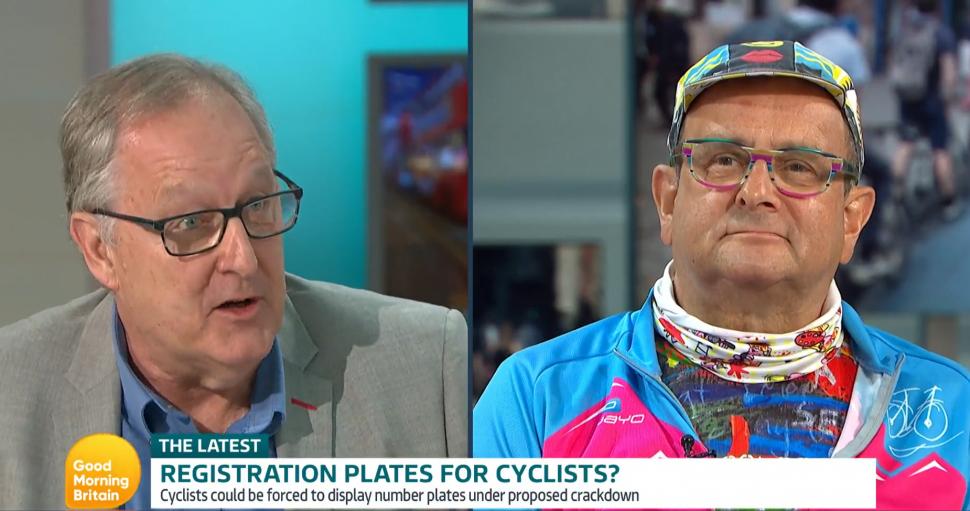 Howard Cox and Timmy Mallett debate cycling number plates on Good Morning Britain
Howard Cox and Timmy Mallett debate cycling number plates on Good Morning Britain12 June 2023, 08:06

“Cyclists are running riot!” Richard Madeley, Timmy Mallett, and Howard Cox ‘debate’ bike number plates on Good Morning Britain – as Fair Fuel UK founder claims cyclists “don’t contribute anything financially to the roads”
So, Richard Madeley, Timmy Mallett, and Howard Cox walk into a TV studio and debate whether cyclists should be forced to put registration plates on their bikes…
No, I’m not describing a live blog and warm weather-induced fever dream I had last night – that was what actually occurred this morning on Good Morning Britain, the home of sensible, breakfast-accompanying discussion in the UK.
And, you’ll perhaps be surprised to learn (though maybe not), it was even more frustrating than it sounds.
'We want to encourage people to be on their bicycles'
'When you go through a 20mph zone and you're being overtaken by electric bikes and other bikes it's an issue'
Should cyclists have registration plates? pic.twitter.com/XuinL88709
— Good Morning Britain (@GMB) June 12, 2023
Truncated due to Michael Gove’s incessant blathering about some former MP (Boris somebody? I didn’t quite catch the name), the ‘debate’ – titled “Should cyclists have registration plates?” – was an awkward, random, and chaotic assortment of mystifying statements and anti-cycling bingo tropes.
Fair Fuel UK founder Cox – a friend of the live blog – made sure to hit all his favourite points right from the start.
“As any HGV, van, or taxi driver will tell you, cyclists are running riot, running red lights, riding on pavements,” he said.
Most cyclists are doing 30 in a 20z jumping red lights. If a big guy on a bike travelling at 30 hits you its not much different to a motorcycle at the same speed.
— henry wright (@swwchels93) June 12, 2023
Cox also noted that people using e-bikes are riding at “30, 35mph” in 20mph zones (a claim that made e-bike aficionado Mallett raise his eyebrows), while he – again dubiously, I must add – added that cyclists “don’t contribute anything financially to the roads”.
Hmmm…
> 'Road tax' is coming... but not for cyclists
Unfortunately, the brilliantly attired Mallett was somewhat less succinct in formulating his own argument against cycling number plates (such as the ludicrous amount of resources that would be required to implement such a measure), a debating style not helped by Richard “I ride my bike every three days” Madeley ignoring his attempts to intervene during Cox’s more questionable claims.
Of course, what passed as a debate on British breakfast TV comes just days after Italy’s transport minister pledged to introduce tougher laws for cyclists, including requiring riders to wear a helmet, take out insurance, and put number plates and indicators on their bikes – before almost immediately backpedalling in the midst of a fierce backlash by claiming that the laws were only ever intended for scooter users.
(Remind you of anyone, Grant?)
And anyway, despite all that nonsense on GMB, surely the Great British public have a much more considered take on the whole matter… or maybe not.
According to a Twitter poll carried out this morning by the programme, at the time of writing 70 percent of respondents believe that cyclists should in fact have number plates:
Should cyclists have registration plates?
— Good Morning Britain (@GMB) June 12, 2023
Oh dear… Timmy, come back!
12 June 2023, 14:45
“It was a good April Fool’s gag in 1985”: Timmy Mallett responds to TV debate that “was over before it began”, and calls for “education not legislation”
Richard Madeley may not have afforded him too much time to stick up for cyclists on national television, but at least Timmy Mallett can take to Strava to rubbish the argument that people on bikes should carry around registration plates.
Posting on the app following his abrupt, rather frustrating appearance alongside Fair Fuel UK’s Howard Cox this morning, the broadcaster wrote:
Come and be in a telly debate… except they rand out of time! And the whole piece was over before it began.
So I got on my bike and pedalled back to Berkshire off road and cycle trails through Osterley Park, Langley Park, Grand Union Canal tow path, Colne Valley trail, and Burnham Beeches. Nice (top speed – slow).
Should bicycles have number plates, MOTs, licences?
It was a good April Fool’s gag on Wacaday in 1985.
Let’s try practising nice behaviour on the roads and when we come across someone who rubs us up the wrong way imagine they are someone you know.
Someone you like…
It’s education, not legislation.
(North Korea is the only country to have something like this, and at the last count we don’t take lessons from there.)
12 June 2023, 15:45
Last word on cycling number plates…
FOR THE LOVE OF CHRIST. NOT. AGAIN. YOU UTTER MORONS. pic.twitter.com/1tlSEh5BFN
— Simon Warren (@100Climbs) June 12, 2023
12 June 2023, 15:11
Bini’s back! Girmay returns to winning ways with comfortable sprint win at the Tour de Suisse… and gets mobbed by his adoring Eritrean fans
Biniam Girmay has certainly whetted the appetite for the sprint stages at next month’s Tour de France, outsprinting Arnaud Démare and Wout van Aert to take a confidence-boosting comeback win on stage two of the Tour de Suisse this afternoon.
After last year’s sensational breakthrough season, which saw him take top-tier wins at Gent-Wevelgem and the Giro d’Italia, 2023 has been a topsy-turvy one for the 23-year-old, with an early win at Valenciana and decent placings at Tirreno-Adriatico overshadowed by a subpar (for his already lofty standards) classics campaign, which ended in miserable fashion following a horrible crash at the Tour of Flanders.
Bini is back 🙌
Biniam Girmay wins Stage 2 of the Tour of Switzerland - and is immediately swarmed by delighted fans 🇪🇷
Incredible scenes at the #tourdesuisse23 pic.twitter.com/nD9zJ3zf6N
— Eurosport (@eurosport) June 12, 2023
Following his comeback from concussion last week, the Eritrean star took fourth at the Brussels Cycling Classic, and underlined his return to form today with an impressively strong surge at the end of a cagey sprint in Nottwil.
As the pace slowed on the final straight, as lead-out men peeled off early, it was left to Van Aert to open the sprint from 300m out. While the Belgian struck out from distance, so did Girmay, who quickly jumped off the wheel of Movistar’s Iván García Cortina before overhauling the fading Van Aert in the final 75 metres. A fast finish from Démare, who found himself boxed in at the crucial moment, wasn’t enough to beat the flying Girmay, who sealed his return to the top in typically flamboyant fashion to take his first win since February and put down an ominous marker for next month’s Tour.
Oh, as well as sparking a brilliant, joyous outpouring of emotion from the jubilant Bini fan club at the finish…
Girmay surrounded by delighted Eritrean supporters, soigneurs and staff struggling to get near him, finish line crowded too pic.twitter.com/1lPGFdJ1vo
— the Inner Ring (@inrng) June 12, 2023
Absolute scenes.
12 June 2023, 14:09
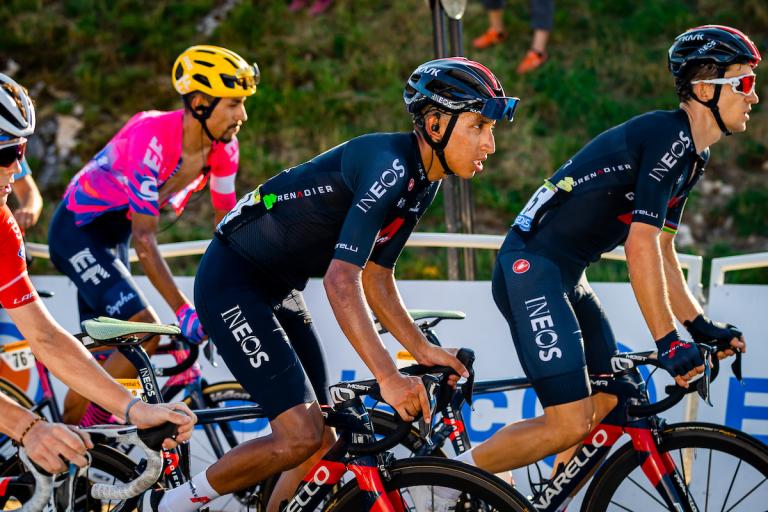
Is Egan Bernal heading to the Tour de France?
Judging by his Strava, it looks like 2019 Tour de France winner Egan Bernal could be set to make his first appearance for three years at cycling’s biggest race next month.
The 26-year-old appears to be slowly returning to form following his horrific training crash last year, picking up two top tens overall at the Tour de Romandie and Tour de Hongrie, before climbing amongst the very best at the Critérium du Dauphiné last week, where he finished 12th on GC.
And today, the Ineos Grenadiers rider followed up his promising week at the Dauphiné by undertaking a recce of stage 16 of this year’s Tour, a hilly 22.4km individual time trial between Passy and Combloux.
The Colombian’s investigative spin has certainly contributed to raising hopes that he will make his first appearance at the Grande Boucle since abandoning with injury during his ill-fated title defence in 2020.
If Bernal is selected as part of Ineos’ eight-rider squad, it’ll be interesting to see if the British team allows him to go stage hunting, or whether he’ll aim for his own high GC placing or be confined to domestique work as he continues to regain his old strength.
In any case, I’m sure most cycling fans would be delighted just to see one of the sport’s biggest talents back on the biggest stage of them all in July.
12 June 2023, 13:38
“Morality and lack of shame are missing in action”: Greater Manchester mayoral candidate vows to ban World Naked Bike Ride
Greater Manchester independent mayoral candidate (and vocal opponent of all things active travel) Nick Buckley – who you may remember from his chat about Just Stop Oil with concrete grower Mike Graham last month – has outlined his vision for the city and its people… by banning World Naked Bike Ride Day, apparently:
This will not be allowed in Greater Manchester next year - if I’m elected Mayor.
We need to bring back common decency and self respect.
Morality and lack of shame are missing in action. https://t.co/bPg37ktGTQ— Nick Buckley 4 Mayor (@NickBuckleyMBE) June 10, 2023
He better stay away from Salford’s magic cycling roundabout, or there’ll be hell to pay! Of course, all this would actually require Buckley getting elected…
12 June 2023, 13:07

Wout van Aert criticises “disturbing” Netflix Tour de France series: “It’s focused on commotion”
The reviews are slowly streaming in for Netflix’s long-awaited Tour de France series (we might even get round to chatting about it on the next Podcast episode. Maybe), but one particularly negative review may give the producers some cause for alarm.
Wout van Aert, one of the stars of the series thanks to his stage-winning, green jersey grabbing, mountain domestiquing performance during last year’s race, isn’t too impressed by the series’ apparent need to create drama where, he says, there was none.
Like many F1 stars before him, who questioned the arguably fictional storylines prevalent in Drive to Survive (made, of course, by the same people behind Unchained), Van Aert says the series is too “focused on commotion” – namely that between himself and Jumbo-Visma leader Jonas Vingegaard, who, if you believe Unchained’s narrative, wasn’t too impressed with his Belgian teammate’s decision to ride away solo to a storming stage victory in Calais early on in the race.
A.S.O./Pauline Ballet
“I was finally able to take a look. Because strange, but true, although I play one of the leading roles, I did not know what would be seen,” Van Aert, who also says he will focus on stage wins and not the green jersey at next month’s Tour, told Sporza this week.
“It is quite disturbing that stories were written in the documentary that were not there. For me, the series is aimed at commotion.
“Jonas and I are best mates. The focus is on moments when it is difficult to make the right choice, but there are also so many moments in which we have strengthened each other and worked together. It is a pity that that has been removed.”
Hmmm… I wonder if Van Aert’s negative reaction to his onscreen depiction will affect Jumbo-Visma’s co-operation with this year’s documentary, with filming already underway? I suppose we’ll have to wait to next year to find out…
12 June 2023, 12:37
Government will struggle to introduce 'death by dangerous cycling' law before next general election, report suggests
The introduction of a ‘death by dangerous cycling’ law, proposed by then-Transport Secretary Grant Shapps last year, is unlikely to be passed before the next general election due to a lack of parliamentary time – though ministers may now turn their attention to a private member’s bill.
Read more:
12 June 2023, 11:58

“Italy’s cyclists are a public menace”: Spectator journalist claims Italian government’s “crackdown on cyclists is long overdue”
Brace yourself. After Howard Cox’s appearance on Good Morning Britain today (as well as Richard Madeley’s latest attempt to out-Partridge himself), it’s the Spectator’s turn to weigh in on cyclists, number plates, tougher rules, and the like.
According to Italy-based Nicholas Farrell, Italian transport minister Matteo Salvini’s plans to make cyclists wear helmets, get insurance, and ride with number plates and indicators (a pledge which the right-wing politician has subsequently backpedalled on) are “long overdue”.
> Italy’s Deputy PM Salvini backpedals on number plates for cyclists – “It’s just for scooters”
Farrell, whose 2003 revisionist history of Benito Mussolini characterised Il Duce as “unfairly maligned”, has his history with cyclists, as his article in today’s Spectator shows.
He notes his first column for a regional paper in Romagna was “tirade against cyclists”, in which he wrote that “I could not help cheer when I read the other day that a cyclist had disappeared into a huge hole in the road he had seen too late and had not come out”.
One paragraph later, Farrell provides us with the reasoning behind this visceral hatred of people on bikes – they “force motorists to waste precious time watching their lycra-clad rear ends bobbing up and down”.
Ah, of course.
The columnist claims that “years of exposure to their arrogance, illegality, and sense of entitlement has shown me that Italy’s cyclists are a public menace” who “break the laws that already exist pathologically”, and that Salvini’s proposed crackdowns “brought a smile to my face”.
Because, Farrell claims, Italy’s cyclists are a “protected species” (the death toll on the country’s roads suggests otherwise).
> Internet troll who wrote “Run over one cyclist to educate 100” cleared by judge
A nearby road, he says, “is a death trap because it is too narrow and people drive too fast”. But who does he blame? Cyclists, of course.
The Grant Shapps-esque Salvini, according to Farrell, “opposes the tyranny of the cyclist, not in the name of fascism, but in the name of liberty. The liberty, for instance, to go to work. You need look no further than London to see where such a two-wheel tyranny leads. It’s not reactionary, it’s democracy.”
I think I might need a whole new bingo book before today’s finished…
12 June 2023, 11:21

From the Roubaix velodrome to the local club 50: Josh Tarling smashes 50-mile time trial record on return to home roads
19-year-old Josh Tarling has enjoyed something of a whirlwind start to life as a professional cyclist.
In his first stage race as a pro, at the Etoile de Bessèges in February, the Ineos Grenadiers youngster finished second in the final 10km time trial, behind former world champion Mads Pedersen no less, before racing against the biggest names in the world at the UAE Tour and Paris-Nice.
A bloodied and battered Tarling exits the Trouée d'Arenberg at the 2023 Paris-Roubaix (Alex Whitehead/SWpix.com)
Then, in April, the Welshman became the youngest rider in 86 years to take on the cobbled hell of Paris-Roubaix during his very first classics campaign. Despite a series of crashes and punctures, Tarling bravely battled his way to the Roubaix velodrome (though cruelly he was recorded as outside the time limit).
And now, after racing the Tour of Norway at the end of May, Tarling is enjoying a bit of downtime at home in Wales. And by downtime, I mean smashing every time trial record going.
Josh Tarling setting a course record in a 50 mile TT today, 1h35s26.
Can we have an 80km TT next year please @LeTour
📷 GBM photography https://t.co/FrrDRiQmph pic.twitter.com/Rw8zg7J6Ml
— Josh Owen Morris (@JoshOwenMorris) June 11, 2023
At yesterday’s Bynea CC 50-mile time trial near Llandovery in Carmarthenshire, the 2022 junior world time trial champion took a whopping 57 seconds off the previous record time, set by Polish TT ace Marcin Bialoblocki in 2019, covering the course in 1:35.26 – almost 25 minutes faster than his nearest rival on the day, Cycling Time Trials reported.
And that’s not all. On Tuesday evening, he set an unofficial course record of 17.37 at the Pontypool RCC 10-mile time trial, and on Thursday beat his own unofficial marker with a 17.22 at the Monmouthshire Wheelers 10.
Blimey. I imagine more than a few Welsh racers will be volunteering to marshal at their local club 10 for the next while…
12 June 2023, 10:51
Elsewhere on road.cc this morning…
Here’s a selection of the latest news, reviews, and previews to help you while away your Monday lunch hour:
> "Complex rope rescue" after cyclist crashes from bridge into river
> Review: Giant Propel Advanced Pro 1 2023
And with the Dauphiné coming to a fairly tepid end yesterday (don’t worry, we’ve still got Wout and Remco at the Tour de Suisse), the countdown to this year’s Tour de France has well and truly started.
So I think it’s about time you became acquainted with the intricacies of this year’s pretty savage route, by getting stuck into our detailed stage-by-stage guide. Unless you’re a time triallist, of course, then this Tour just isn’t for you…
> Tour de France 2023: From Bilbao to Paris, our stage-by-stage guide to cycling’s biggest race
What do you mean, you still haven’t finished watching the Netflix doc yet?
12 June 2023, 10:21
Timmy Mallett: The Voice of (Utterly Brilliant) Reason
From this morning’s comments section:
It’s Mallett’s world, we’re all just living in it…
12 June 2023, 10:11
Bloody cyclists! (Quite literally…)
Brilliant clip – especially love how the cyclist just nonchalantly rode away across the field afterwards – though I’m less sure that the anti-cycling bashing was necessary in the caption…
12 June 2023, 09:55
So… Pro riders wanting a road closed to traffic means they’re “spoiled”, but when amateurs are riding through…
On what was the finishing circuit for Fridays stage of the tour of the Pyrenees (where there where parked and moving cars in the last 3km) the road is currently totally closed (large police presence at junctions) with all cars cleared for a sportive. I am totally speechless pic.twitter.com/saRIpKSAKc
— Connie Hayes (@connie_hayes123) June 11, 2023
To add yet more insult to insult to injury, it turns out that it is in fact perfectly possible to completely close off a road through Lourdes for a cycling event.
If that cycling event happens to be an amateur sportive, and not an elite women’s pro race, apparently.
22-year-old British pro Connie Hayes, who was riding the Tour des Pyrénées for AWOL O’Shea – and so experienced first hand the traffic bedlam on the finishing circuit through Catholic Disneyland, I mean Lourdes, on Friday – tweeted yesterday that she was “totally speechless” that the road was completely clear of parked cars, and that junctions were being guarded by police, just two days later… for a sportive.
It really is. I was speechless when we rode past this afternoon seeing a full closure where we had risked our lives in an elite uci race just days before and I am not someone who is usually speechless!
— Connie Hayes (@connie_hayes123) June 11, 2023
Exactly, I am so confused by the organisers comments as we race multiple times a year in France and never have any issues and nearly always feel safe for the whole race
— Connie Hayes (@connie_hayes123) June 11, 2023
12 June 2023, 08:56
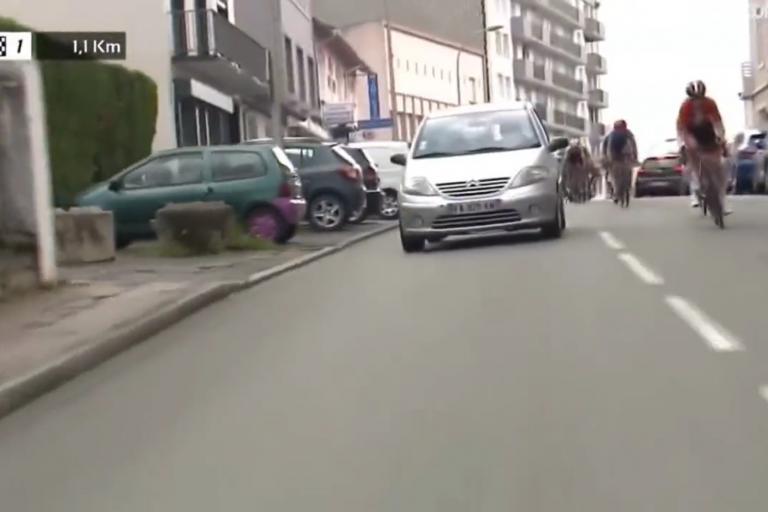
“They think they’re on the Tour de France”: Backlash against “sexist” race organiser who called pro riders “girls” and “spoiled children” over cancellation due to safety fears
Unfortunately, this year’s Tour Féminin des Pyrénées won’t be remembered for a scintillating battle on the fearsome Hautacam, or for Marta Cavalli’s long-awaited return to winning ways after a difficult year.
Instead, the three-day stage race will be remembered for the UCI’s decision to call off the final stage following protests from a peloton concerned for its safety after two stages dominated by members of the public driving on the course (and even towards the riders), parked cars littering the final kilometres of stage one into Lourdes, race motorbike riders creating hazardous conditions, spectators wandering on the roads, a lack of marshals, and, finally, successful calls to neutralise most of the second stage to the foot of the Hautacam.
> "What a mess": Chaos as live traffic passes metres from racing peloton
“Considering the safety risks involved, we firmly believe that a bike race is not worth endangering the lives of the female cyclists,” Adam Hansen, the head of the riders’ union the CPA, said in a statement announcing that yesterday’s third and final stage had been cancelled.
If your finale looks like this, with random vehicles everywhere, you're not worth organizing a race. What were they even thinking? The attitude of the organizers makes it clear: no single rider will participate if there comes a new edition without drastic changes. pic.twitter.com/VUvJOhXjdt
— BramDesmet (@BramDesmetKoers) June 11, 2023
> Tour Féminin des Pyrénées stopped amidst rider safety issues
So, how did the organiser of the Tour des Pyrénées react to being at the centre of a media frenzy (the race’s cancellation even made the BBC’s website!) concerning the running of his event?
By creating another, entirely different kind of media frenzy.
“What is happening is that the girls have requirements that are not in line with their level,” race director Pascal Baudron told La Nouvelle République yesterday morning.
“They imagine that they are on the Tour de France and that all the roads must be closed. But in France you cannot do that.”
Baudron continued: “They are sawing off the branch of which they are sitting. The day when there will be no more races, they will cry and that’s what’s going to happen.
“Quite honestly, I tell myself that it is not worth organising a race to see all those months of effort ruined for the whims of spoiled children.”
Omg those comments are from someone from the 15th century! Certainly they can’t organise a race if they do not think the athletes deserve safety measures ! Unacceptable!
— Evelyn Campos Flores 🌳 (@wevecampos) June 12, 2023
Unsurprisingly, Baudron’s questionable use of language, and his belief that top-tier pro cyclists are “spoiled children” for believing that they should be able to race without motorists driving at them, hasn’t gone down too well with most of the cycling community.
Some described the organiser’s comments as “sexist”, “offensive”, and “from the 15th century”, with Twitter user Jonathan writing: “The numerous use of ‘girls’ and ‘spoiled brats’ is quite telling of his attitude towards women”.
You'd expect something like yeah it was not good enough but it's hard and we'll do better next year. But this is just taking the piss with road cycling and the sponsors should not be happy. That's saying it nicely.
— Marco van den Hout (@mvdhout) June 11, 2023
“Female riders being called spoiled for, er, not wanting to be hit by cars?” wrote cycling journalist Matilda Price. “Extremely basic levels of safety shouldn’t be the reserve of the Tour.”
“Sounds like it’s the race organisers with ‘requirements above their level,” added Ryan. “They expect the best cyclists in the world to show up to their race but they're not competent enough to fill out the forms to close the roads?”
Organising a major bike race is tough (as we’ve seen in Britain over the past year or so), but that’s certainly one way of ensuring you lose all the sympathy you had from onlookers, I suppose…
After obtaining a PhD, lecturing, and hosting a history podcast at Queen’s University Belfast, Ryan joined road.cc in December 2021 and since then has kept the site’s readers and listeners informed and enthralled (well at least occasionally) on news, the live blog, and the road.cc Podcast. After boarding a wrong bus at the world championships and ruining a good pair of jeans at the cyclocross, he now serves as road.cc’s senior news writer. Before his foray into cycling journalism, he wallowed in the equally pitiless world of academia, where he wrote a book about Victorian politics and droned on about cycling and bikes to classes of bored students (while taking every chance he could get to talk about cycling in print or on the radio). He can be found riding his bike very slowly around the narrow, scenic country lanes of Co. Down.
Latest Comments
- chrisonabike 4 sec ago
Indeed - the fallacy / confusion seems to have been that:...
- thax1 37 min 17 sec ago
Not quite long enough for him to have a think about what he'd like to say on stage when collecting the award apparently. Which you have to love him...
- LeisureRider 40 min 53 sec ago
As an amply-figured female leisure cyclist, the comfort of a slightly downward angled saddle has long been known for avoidance of mincing one's...
- Rendel Harris 44 min 8 sec ago
There is a plethora of research available that demonstrates that harsher sentencing has no positive effect on crime levels, indeed it may even have...
- stonojnr 1 hour 18 min ago
Certainly membership trippled in numbers between 2012 to 2019.i think it's been in decline since so theydon't tend to shout about the numbers...
- OnYerBike 2 hours 1 min ago
The Sora groupset seems very expensive for what it is. Even without going down the AliExpress route, you can get 11spd 105 for £360 (https://www...
- bikes 2 hours 10 min ago
Driving culture in a nutshell. Dangerous and with tiny/nonexistent penalties. ...
- hawkinspeter 2 hours 15 min ago
I like the way that it can collect water in the wrong places and so putting it through a car wash invalidates the warranty.
- mdavidford 2 hours 18 min ago
You're overlooking the 'lifting it out of the shed' factor, though.
- hawkinspeter 2 hours 16 min ago
I'd say that Mogg Street is more likely used by cyclists who opt for the bridge over the M32 rather than the underpasses as opposed to trying to...


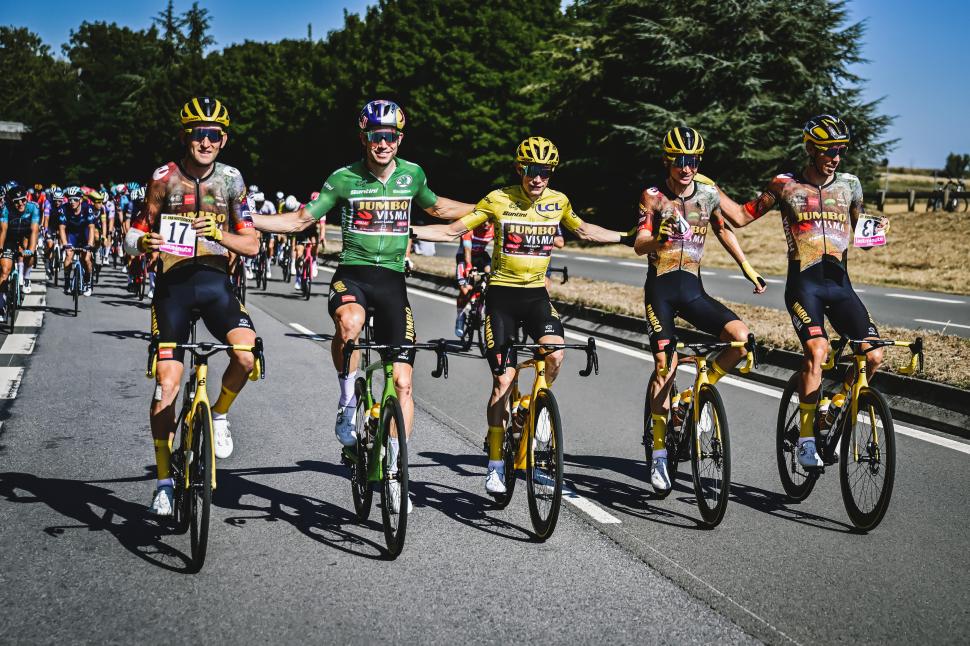
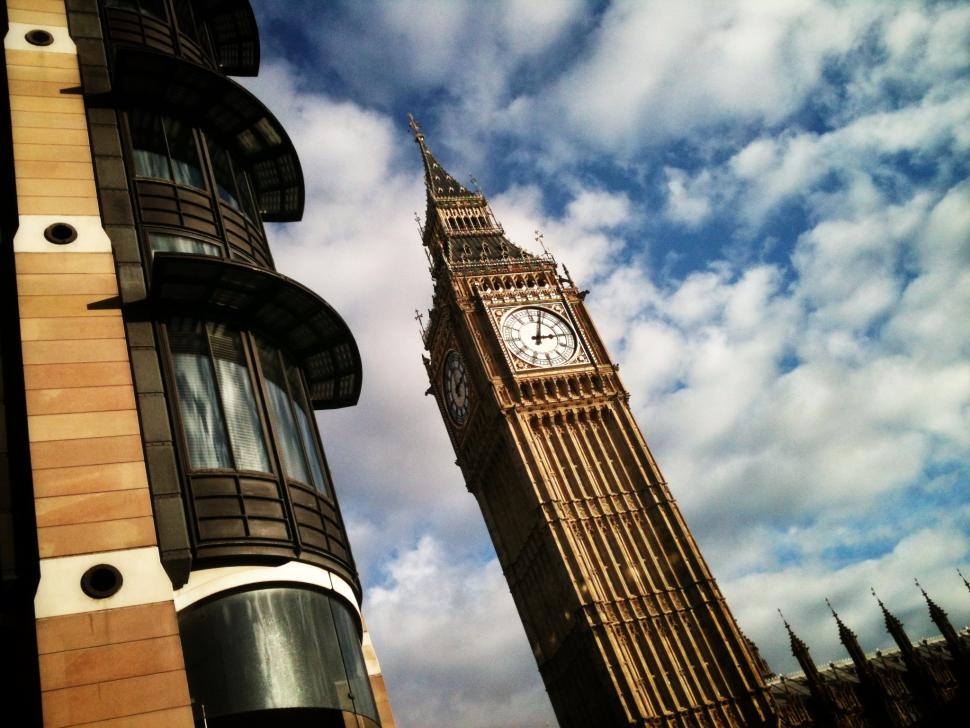
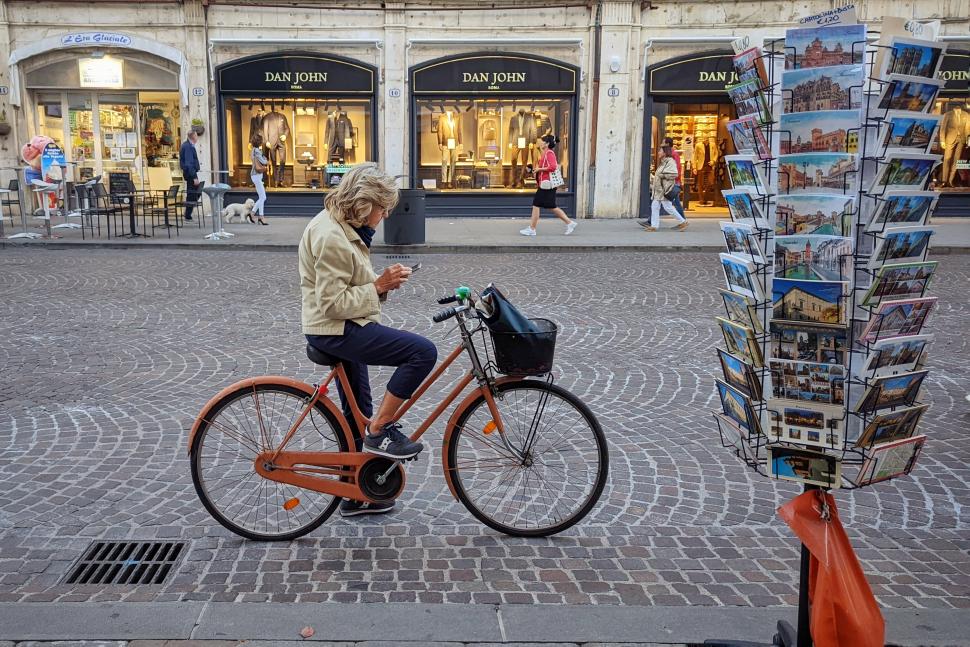


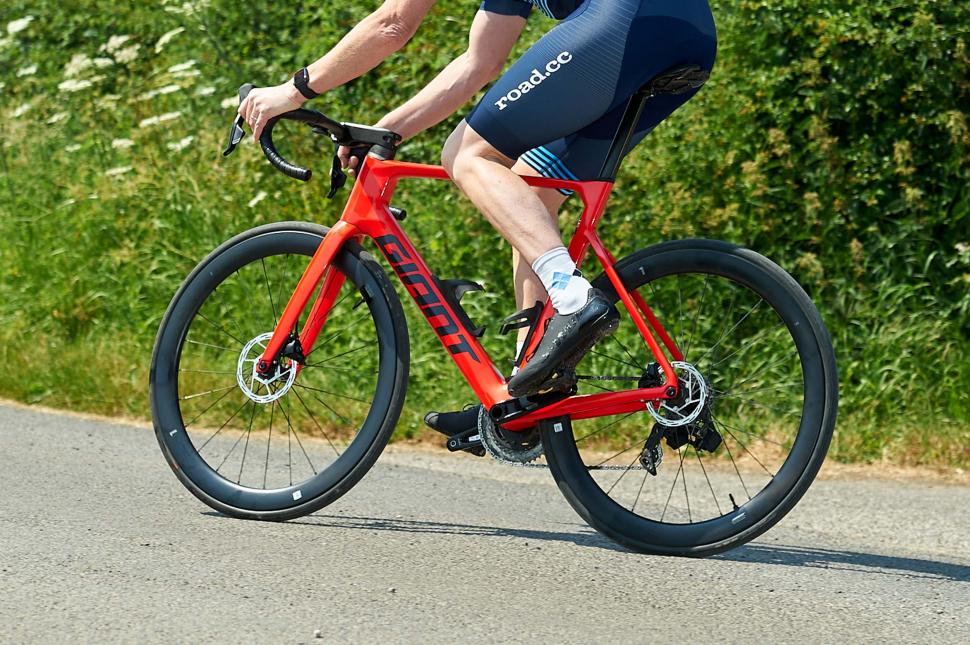


Add new comment
102 comments
I would love to know the value of the cycling pound to the economy.
I, like many others, love visiting some far flung cafe in some obscure village, at the weekend. I am sure that many of these, largely independent, establishments would struggle without the influx of cyclists. So not just a benefit to the economy but also supporting a local community asset. Surely, all this whilst paying 20% VAT to pay for our road usage.
Conversely, when at the weekend hoards of drivers block up our town with bad parking just to get to the local bathing spot, somebody always suggest that it benefits the local economy. I am yet to see any evidence of this as many might be buying their beer and bbq/picnics out of town before arriving. Even if they do pop in to Tescos or Sainsburys I'm not sure that it's supporting the local economy as these places would survive without them and any surplus profit is unlikely to be spent in the town.
Not only are they buying their beer and BBQs elsewhere, but many of them will be leaving your town - your council tax payers - with the bill for picking their shit up after them.
Having seen the crap that gets left behind every time the sun comes out on a weekend by daytrippers in cars, it would have thought that their impact on the local economy is primarily negative.
Howard Cox "...what we need to do is get some common sense...." and then goes off into the realms of idiocy about number plates and tabards.
Yes Howard, you do need some common sense: we don't.
And another thing. An estimated 4.5% of vehicles on the road are uninsured. The police can't even keep a lid on that.
With just under 4 million vehicles registered, that puts a figure of around 175,000 uninsured vehicles nationwide.
If they struggle to keep tabs on 175,000 cars, vans, motorcycles etc, how on earth do you expect them to keep tabs on an additional 20 million bicycles?
You can multiply those figures 10x, it's just under 40m vehicles registered in the UK.
Was just about to say the same!
It's worse than that: estimates are in fact that there are around a million people driving in the UK without insurance, as many as 1.5M vehicles on the road without MOT, 600,000 on which VED hasn't been paid and a truly staggering 800,000 drivers who either don't have a licence or whose licence is currently suspended.
BuT CycLiSts!
Bastards: none of them have a cycling licence.
I have a cycling proficiency badge given to me circa 1981, does that count?
It's the later figure of unlicensed motorists that truly frightens me. I was had an argument that the number of unlicensed motorists outweighed the number of regular cyclists as in those who solely use a bicycle for transport on a daily basis. They refused to believe me until I started to pull those figures up.
Oh how I would love to live in a place with 20m bicycles but only 4m motor vehicles.
Be careful what you wish for.
In "cycling friendly" countries such as the Netherlands, bicycles might outnumber cars, but only by around 2:1 (~23 million bikes; ~10 million cars). And Netherlands is an extreme - even in other cycling friendly countries such as Denmark, it's closer to 1:1 (~4.5 million bikes and ~3 million cars).
A bit of googling suggest that the majority places with higher numbers of bikes:cars tend to be less developed countries - this bit of research is the best I've found: https://www.pewresearch.org/short-reads/2015/04/16/car-bike-or-motorcycl... E.g. in Uganda 49% of households have a bike but only 3% have a car; Vietnam 67% have bikes but only 2% cars. I couldn't find numbers of North Korea but the information available suggests cars are rare and bicycles very common.
As has been said on here before, "Cyclists are running riot!" is only a thing once you completely ignore all the damage and injuries caused by motorists (and let's not forget that a good many of them have no licence, or (edit) insurance
registration, or are driving around using someone else's registration plate).We have a culture which treats road violence as 'just one of those things', like the weather...
Also, if they're "running", then they're not cyclists are they?
The organisers of the Tour Feminin des Pyrenees should be stripped of their licence to organise races for that. In an area that is quite used to races and events coming through the area, with road closures managed well for even ameteur events, they should hang their heads in shame instead of backing down on their mysoginistic tripe. They are, in most cases, full time professional athletes who deserve better, who are used to riding closed road races that are properly organised because that is their god damn job. The organisers clearly failed at theirs. Could you imagine the World Tour being forced to ride open roads? If that's their attitude why don't they try to organise a World Tour circuit race along the length of the M25 whilst open to traffic on a Friday preceding a Bank Holiday weekend? And then tell the rider's they're spoiled if they complain! No different, am I right?
(Yes I know cycling on Motorways is illegal and therefore is different but I doubt that the organisers would see it that way)
I dont know the guy is being mysoginistic, as I highlighted on the article covering the race cancellation, Audrey Cordon Ragot addressed all the assembled riders on the stage 2 stoppage when they were discussing their next step as "girls" also, no one is sensibly claiming she was being disrespectful doing that.
labelling the riders spoilt children isnt particularly smart, but lets not be distracted from the real fundamental issue this race had which is road safety and safety of the riders during the race, and not by perceived misinterpreted language differences.
the quote about "They are sawing off the branch of which they are sitting. The day when there will be no more races, they will cry and that’s what’s going to happen." in the article I read actually he was repeating something one of the other race directors had said to him, either Elisabeth Chevanne-Brachet or Marion Clignet, obviously he agrees with it.
But again step back he wasnt running this race alone, and both Chevanne-Brachet and Clignet are themselves former pro women cyclists, Chevanne Brachet did give a video interview post cancellation which my gcse french couldnt quite keep up translating, but I didnt get the impression her views on the situation that developed or the amount of safety provided for the riders, were at odds with Baudrons statement that ended up in the papers.
stripping of them the right to run races I dont think is the solution, ensuring they or other race organisers never end up in the same position again probably is.
You do get that a term of reference thats ok for peers to use is not necassirly ok for a non-peer to use right? A man calling a group of professional women "girls" is just as bad as me walking up to a group of PoC and saying "wassup niggas". You dont use dimunitive or possibly derogatory terms unless invited to do so.
(And yes this is woke. Respecting and considering other peoples thoughts and feelings tends to be that. Which is why an insecure section of a dominant demographic kicks back against it - coz it causes them to challenge their assumptions of authority. Thus endeth the rant.)
my point on that is Im not a native french speaker, and Google translate isnt particularly smart at picking up the nuance of how language is actually used in real life, as it has no context.
just chucking some words into it to translate, yep filles means girls (can also mean young women actually and there were lots of young women in that race) & femmes means women, great weve translated some words, doesnt mean we have understanding or comprehension of what the speakers intent was with the words they did or didnt use, or whether theres a regional variation in play, or what was going on, language is far more complex than just individual words and doubly so when you are translating between languages.
Audrey who is a native french speaker was quite comfortable to translate in to English and call the whole assembled riders group, "girls", I dont doubt she'd have used filles as well had you she spoken to the group in French instead.
so how can I judge whether the guy is misogynistic based on one google translated word ? I cant, and I wont use labels like that unless Im sure of their actual intent. Whilst it clearly excites alot of the online community to focus on it, imo it unnecessarily diverts attention away from the main and more important problem of the race which was rider safety.
whether the guy said filles and not femmes is an irrelevant sideshow as far as Im concerned, as to the more important issue of why he and his fellow race directors (2 of whom are women) believed the safety bubble they had provided was adequate, and is far more deserving of the ire & focus on all 3 of them.
Something tells me there is far more to the story than is easily dismissed by just glancing at the optics. And jumping straight to vilifying and censoring based on word choices without actually doing any empathising is the usual 'woke' thing to do and distracts from the bigger issue of rider safety. From the video clearly a disaster waiting to happen, calling it off seems totally justified.
really?
I'm convinced, this is a professional womens race, to suggest it is not at the same level as a pro mens race or even a sportive, clearly suggests this organiser has no respect for women's sport, and so I wonder how he is even involved in organising it.
yes really, is it that strange not to jump to immediate conclusions about people off the back of one sentence in a newspaper thesedays ?
the race director, who as Ill keep reminding people was simply 1 of 3 involved in running this race, stated it was not the same level as the TdF.
Which pedantically speaking is completely correct, this was classified a 2.1 race which puts it on a par with La Route d'Occitanie or the Tour of Britain, not a 2.uwt or 2.wwt level event like the TdF or TdFF.
I dont for a minute expect either La Route d'Occitanie or the Tour of Britain to ever leave riders to deal with the same levels of vehicle incursion on their stages, as happened here, but theres an understanding at least that TdF levels of lockdown on roads arent part of the deal in those races.
but there is a cost associated with the level of traffic marshalling required to provide even a temporary safe route, it may well have contributed to the loss of the Womens Tour this year, and its likely no coincidence the Lotto Belgium Tour, also a 2.1 race, was cancelled last week due to the fall through in guaranteed traffic management of the race which impacted the safety of the stages and there wasnt the budget, to outsource it to an external company.
the issue is why those involved in the running of the Tour Féminin International des Pyrénées felt the level of safety they were providing was adequate, not whether we judge they have or have not the requisite respect for those taking part in their race.
Women's Tour of Britain have had cars parked on course in the final, and also some very sketchy course decisions which have led to crashes
Ok if you want it, I may put a number plate as long as it is aero enough.
But then since cyclists with their 10mph and 100kg weight are closer to pedestrians with 3mph and 80kg weight rather than the cars 60mph and 1200kg, pedestrians will have to wear plates too.
Good luck trying to convince your girl that her number plate dress seems great
My "girl" would be even more upset at me referring to her as "my girl"!
Fortunately, she doesn't frequent cycling websites!
I'm complaining to trading standards, there is no way there is 8350kg of girl in that dress. false advertising I say.
But is she small, or actually big but very far away?
...
Why the f*****g hell is anybody talking to that Howard cock(s) anyway, He is standing for London mayor as the representative of known racist, mysoginist and conspiracy theorist Lawrence Fox.
"Cycling doesn't contribute to the roads"
Neither does driving. (Highways excluded - i.e. Motorway network and arterial A roads)
As a public space, roads, lighting, signage and street furniture are the responsibility of local authorities. Funded primarily by, of all things, COUNCIL TAX. (Shock horror!)
Assuming that a cyclist and a driver both pay the same tax rate at a random figure of £1500 p/a how long does it take each of these people to cause £1500 worth of wear and tear onto the road network?
I cannot find a link to an article on the subject but if my memory serves me well, a bicycle causes on average £1 worth of wear and tear per year as a suggested tax rate. So, effectively, a milennia would pass and the council would earn interest on the tax payment faster than it costs to repair. A car (Large family hatchback) was given a figure of £15,000. So a car takes little over a month to cause enough wear and tear to eat through that council tax payment.
Pages